I am an apostate.
Or so I hear.
It has recently come to my attention that certain members of my ward have taken to calling me an apostate, likely because of articles I have posted at Rational Faiths.
It is hard for me to tell precisely what it is I may have said or written that causes others to view me as an apostate; largely because they haven’t been willing to say it to my face.
So I am left to speculate.
Am I an apostate because I received a spiritual witness of the Book of Mormon when I prayed my way through it at the age of 18; a witness that has never left me and which I could never deny?
Am I an apostate because of the articles I wrote arguing the Book of Mormon is a product of the ancient world? (See here and here.) 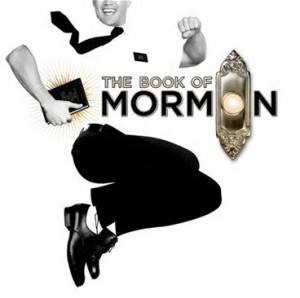 Or because of the article I wrote showing the Book of Mormon is a product of the modern world?
Or because of the article I wrote showing the Book of Mormon is a product of the modern world?
Am I an apostate because I have demonstrated a complexity to Book of Mormon narratives evincing patterns likely beyond the abilities of an early nineteenth century upstate New York farm boy? See here, here, here and here.
Am I an apostate because I believe Joseph Smith to have been in touch with the Divine during his brief prophetic career? Or is it because I recognize he was a person who, like the rest of us, struggled with his humanity and suffered from numerous character defects?
Am I an apostate because I voted to legalize gay marriage? Or is it because I believe the overturning of state laws forbidding gay marriage by federal judges to be unconstitutional?
Am I an apostate because I agree with President Uchtdorf that “leaders in the Church have simply made mistakes”?[i]  Or is it because I disagree with Elder Oaks that Church leaders are above criticism for such mistakes, and that “it does not matter that the criticism is true”?[ii]
Or is it because I disagree with Elder Oaks that Church leaders are above criticism for such mistakes, and that “it does not matter that the criticism is true”?[ii]
Am I an apostate because I do not believe God instituted a policy denying the Priesthood to black men, and temple ordinances to black men and women? Or is it because I believe the Church should apologize for this racist policy?
Am I an apostate because I believe I have personally experienced all the spiritual gifts set forth in the seventh Article of Faith?
Am I an apostate because I stood up for Mother Eve when she was being denigrated at church,  and raised my voice while so doing?
and raised my voice while so doing?
Am I an apostate because I posted a profile at Ordain Women, joining my voice with a rising tide of Church members who believe the Priesthood ban on women should be lifted, even as the Priesthood ban on black men was lifted in 1978?
Am I an apostate because I agree with the LDS definition of hell and damnation as “The state of being stopped in one’s progress”?[iii] Or is it because I perceive the Correlation Committee has managed to create a church that matches the definition?
Am I an apostate because I agree with Joseph Smith that “One of the grand fundamental principles of Mormonism is to receive truth, let it come from whence it may”?[iv] And that “We should gather all the good and true principles in the 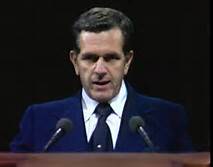 world and treasure them up, or we shall not come out true Mormons”?[v] Or is it because I disagree with Elder Boyd K. Packer’s comment that “some things that are true are not very useful”?[vi]
world and treasure them up, or we shall not come out true Mormons”?[v] Or is it because I disagree with Elder Boyd K. Packer’s comment that “some things that are true are not very useful”?[vi]
Am I an apostate because I agree with Joseph Smith that “the creeds set up stakes, and say, ‘Hitherto shalt thou come, and no further’; which I cannot subscribe to”?[vii] Or is it because I am at odds with Elder M. Russell Ballard’s discouragement of teachers who “stray from the approved curriculum materials”? Is it because I sense that one can faithfully attend Church meetings for a 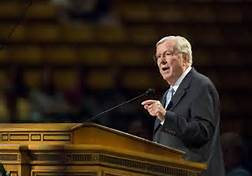 lifetime and never really graduate from Primary?
lifetime and never really graduate from Primary?
Am I an apostate because I disagree with President Eyring when he suggests a faithful Mormon should accept any calling extended by Church leaders, and that the failure to do so puts one in “spiritual peril”?[viii] Or is it because I see this position as conflicting with the fundamental doctrine of agency; the agency scripture tells us Satan sought to destroy when he rebelled?[ix] Is it because I believe many in the LDS Church have effectively redefined “agency” to mean the freedom to do what you are told?
Am I an apostate because I believe it is more important to be a good person than it is to be a member of the LDS Church?
Am I an apostate because 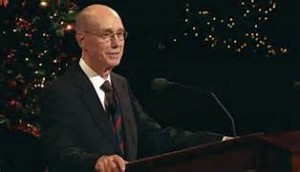 I believe God’s revelations and visions are available to all people everywhere, and are not restricted to members of only one organization?[x]
I believe God’s revelations and visions are available to all people everywhere, and are not restricted to members of only one organization?[x]
Am I an apostate because I recognize that the last revelation published by the LDS Church was received in 1918, a full 96-years ago?[xi] Or because I can do the math and calculate that, for more than the last half of the LDS Church’s existence, it has been without new canonized revelation?
Am I an apostate because I believe there is a substantive difference between a revelation of God’s will and a declaration that such a revelation was received? Or is it because I do not recognize continuing revelation in sermons that simply rehash the same subjects over and over again?[xii]
Am I an apostate because I agree with Jesus that prophets will be  known by their fruits?[xiii] Or is it because I wonder that the decisive qualification for the LDS Prophet seems to be the ability to outlive fourteen of his colleagues?
known by their fruits?[xiii] Or is it because I wonder that the decisive qualification for the LDS Prophet seems to be the ability to outlive fourteen of his colleagues?
Am I an apostate because I disagree with Elder Bruce R. McConkie’s “Seven Deadly Heresies”? Or is it because I agree with Joseph Smith that a man isn’t “damned for believing too much; but they are damned for unbelief”?[xiv] Is it because I, like Joseph Smith, “want the liberty to believe as I 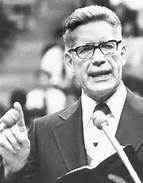 please,” and that “it feels so good not to be trammeled”? Is it because I agree with Joseph Smith that, “It don’t prove that a man is not a good man, because he errs in doctrine”?[xv]
please,” and that “it feels so good not to be trammeled”? Is it because I agree with Joseph Smith that, “It don’t prove that a man is not a good man, because he errs in doctrine”?[xv]
Am I an apostate because I have slipped the surly bonds of correlated dogma? Because I have realized that there really are “words of wisdom” to be sought out of the “best books” if only I take the time to read them? Or is it because I have found that in so doing,  the heavens are now open as never before, and God is more willing to speak freely to me as one person speaks with another?
the heavens are now open as never before, and God is more willing to speak freely to me as one person speaks with another?
And finally, am I an apostate because I believe the LDS Church should accept and fellowship members of various opinions and orientations? Or is it because I believe Mormons should not be labeling other members with differing viewpoints as apostate?
Perhaps those who have called me an apostate behind my back will read this post and clarify to my face why they think I deserve that appellation.
I hope they do.
[i] Dieter Uchtdorf, Come Join With Us, October 2013 General Conference
[ii] The Ensign, Feb. 1987, Dallin H. Oaks, Criticism
[iii] LDS Guide to the Scriptures—Article on “Damnation”
[iv] Discourses of the Prophet Joseph Smith, p. 199.
[v] Teachings of the Prophet Joseph Smith, p. 316.
[vi] Boyd K. Packer, The Mantle is Far, Far Greater Than the Intellect, Address to the Fifth Annual CES Religious Educators’ Symposium, 1981.
[vii] Teachings of the Prophet Joseph Smith, p. 327.
[viii] Henry B. Eyring, To My Grandchildren, October 2013 General Conference
[ix] Moses 4:3
[x] 2 Nephi 29:7; Alma 29:8
[xi] D&C 138
[xii] See any and all General Authority talks available on the Church website, lds.org
[xiii] Matt. 7:15-16
[xiv] Teachings of the Prophet Joseph Smith, p. 373.
[xv] The Words of Joseph Smith, pp. 183-184.

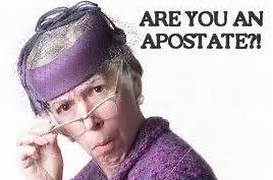



Amen.
I am a new covert to the church I am a freemason and I have been criticized all my life for believing things the way I do I have judism on my dads side and christianity on my moms side. I was raised jewish. I was shunned by my fellow jews when I accepted jesus Christ when I was 25 years old The church has so many wonderful things but the church needs improvement we need to become spiritual and have a stronger connection to god I agree with everything that was written in this article. I stay to the light. My relationship with god comes first before any relationship to any church. I look at things differently I keep one foot in and one foot out so I never lose my magic. I have given out since May 2013 75 books of Mormon I share the book I expect nothing I let people decide for themselves and I continue to love the people in my life wether they decide to join the church or not. We are all equal in the eyes of god and we are his sons and daughters. I have had many revelations from God on this through out my life. We are all prophets in our circles of life. I guess I am guilty of being an apostate I take that as an honor that I know I am on the right path in my life….
Corbin,
I love posts like this! Not only does it feel great to hear the strength you have gained through study and faith come through in your own personal beliefs, but that same strength transfers through your words to those of us who are slow of speech.
Those who are unsure how to vocalize these knit together feelings we share with others of stronger voice. I hope we may not be a backload upon you, but become sure in our faith as we hear the strength of God within the Truth others speak. It is reassuring to hear that we may not be alone in our private convictions, that those things that make us flinch cause the same reaction in others, that someone of stronger stuff is out there that believes like we do.
God has blessed you.
And today God has blessed me with a wonderful post such as yours.
Thank you so much, Stephanie!
I’m sorry this has happened to you. One should never be betrayed in the house of his friends. Though I’ve read it happens to all the best people…
LOL!
Zech. 13:6
Awesome!!!
Apostate is a term for someone who is against the church and fights it. The proper term for you is heretic. You don’t believe everything. I like your spunk. The sociological issue you are pointing out is that many Mormons are narrow minded minions who parrot whatever the Manuel says but truly choose not to study or think. It is their ignorance that lowers them to call you, “apostate.” independent thought was once encouraged in the church. Those days are gone. You have every right to think.
“We must preserve freedom of the mind in the church and resist all efforts to suppress it. The church is not so much concerned with whether the thoughts of its members are orthodox or heterodox as it is that they shall have thoughts.”
–Hugh B. Brown
I appreciate Corbin’s post and think he makes some great points. People calling him offensive are certainly not acting in a Christ like manner; however, Jenny, when you begin calling those who don’t ask the same questions you do “narrow minded minions who parrot whatever the Manuel says but truly choose not to study or think” and then call them ignorant, are equally as offensive! What we need is more unity among all members, whether they’re “narrow minded minions” or “apostates”. We should spend more time focusing on all that we have in common (which is much more than where we disagree), and seek to love and uplift each other, rather than using divisive and hateful language to describe those who think differently than us.
I’ve been thinking a lot about Dallin H. Oaks’s talk “Criticism.” I’m going to disagree with you on your characterization of his statement: Elder Oaks doesn’t assert that LDS leaders are above criticism, rather he asserts that public criticism is harmful to a member’s spirituality and leadership effectiveness. While this might seem like a small difference, I think the distinction between public and private dissent is important because of how it affects us and the church. Before you scream at me for being a TBM, realize that I also believe that Elder Oaks is trying to teach a general principle. I think Elder Oaks might teach the principle different today, with the information age having made almost everything quasi-public. Of course we will express feelings sometimes about how we don’t think leaders make the right moves. But should we always? I’m trying to glean the principle, which might be that our church leaders deserve some measure of deference and that each member should realize that there is some special effects from publishing critiques of our leaders in a book or on the cover page of the NYT. The internet makes everything more of a degree/magnitude determination when deciding whether or not to discuss differences with our church leaders: there simply isn’t as much of a bright line as there was in 1987. Our discussions now are not exactly like private conversations in living room. We should be cognizant of the different effects of quasi-public criticisms, otherwise we can be poisoned by adulation and we may end up standing still arguing like Dr. Seuss’s North/South-going Zax.
Elder Oaks said that Church members should not criticize Church leaders, and that, “It does not matter that the criticism is true.”
I’m not going to “scream” at you, but I fail to see how what Elder Oaks said is any different from saying that Church leaders are above criticism.
Sorry but Elder Oaks did not say “members should not criticize Church leader.” On the contrary, he said “There is nothing inappropriate about private communications concerning such differences [between members and church leaders], provided they are carried on in a spirit of love….Church members can work for correction of a leader or for change of a policy.” Please look at the talk as a whole. He provides five procedures for managing differences and for carrying out this work of correcting church leaders/policies. Obviously this progressive work would involve a Church member being critical. Maybe you don’t love the procedures he teaches (neither do I), but that’s different from saying “GAs and bishops are above criticism.” As I already explained in my previous comment, I think Elder Oaks might teach this principle differently in the wake of the GAs embrace of social media and the information age. The nature of the internet requires us to evaluate the effects of a quasi-public discussions that are critical of church leaders/policies. That does not mean that all informal internet discussions regarding the direction of our Church are discouraged by Church leaders.
Also, I should note that Elder Oaks is using a narrow definition of the word “criticism” which he explains in the first couple paragraphs of his address:
Elder Oaks also quotes President Gordon B. Hinckley said:
Thanks for reading charitably. I don’t think the word “apostate” is a black & white issue. I think we are all somewhat apostate and a lot of that determination is based on our attitude. I expect that others won’t judge correctly about what our attitude really is, but sometimes they can give us useful hints and help us reevaluate our motives.
I think most of the time those who call others ‘apostates’ are the rankest kind of apostates, but then I am probably being harsh.
Gossips, for sure. I’m sorry.
“Agostates”?
I’ll also want to express that most Church members don’t really wrap their minds around the difference between [1. the radical theological style of Joseph Smith] and [2. the corporate modern correlated Church theology/public relations]. There are advantages to each style, especially based on the environment in which the institution finds itself. I think the next generation is going to continue trying to find a balance between the two. Many LDS members have the second theological/cultural pattern ingrained into their heads, so it doesn’t shock me that Apostate labels might be attached to those who try to play with the more radical ideas. It feels safer to conform. TBMs feel safe with the group and they feel even more comfortable as they point a scornful finger at others who aren’t quite as “celestial.”
I agree with much of what you say here, CeeJay and appreciate your comments.
I fear, however, that the transition from charismatic spirituality to corporate correlation may not be a two-way street.
I love this! It makes me feel like I am not alone. It only strengthens my testimony to listen to someone of my faith question things they disagree with and accept the human in all of us, prophet or not. Thank you for this. I see now that I don’t have to agree with everything and everyone in the church to be an upstanding member. You are NOT an apostate! You are a leader in our church, at least someone I would follow!
🙂 I think we might be soul mates! Loved every word of that!
Thanks, Suzy!
I’m sure my wife will be glad to hear that. ;^)
“I think we might be soul mates! Loved every word of that!”
That’s how I felt too. Corbin–excellent post. Wonderful thoughts. I’m with ya. We’d be good friends.
In the order they were asked, with no offense intended; these answers are just my opinion …
No.
No. No.
No.
No. No.
Yes. Not applicable.
No. Yes.
No. Yes.
All of them? Really, ALL of them? Well okay, No.
No.
Yes.
No. Yes.
No. No. Yes.
No. Yes.
Yes. Yes. Yes.
You got me there, I don’t know.
No.
Yes. Yes.
No. Yes.
No. Yes.
Yes. No. No. No.
Yes. No. No.
No. Leaders: Yes, but members: No.
Btw, Corbin, are you on Facebook?
No. Sorry.
I’ll refer you to the quote from Chesterton on the RF website, which I’ve loved since I heard it many years ago:
“A man does not come an inch nearer to being a heretic by being a hundred times a critic. Nor does he do so because his criticisms resemble those of critics who are also heretics. He only becomes a heretic at the precise moment when he prefers his criticism to his Catholicism. That is, at the instant of separation in which he thinks the view peculiar to himself more valuable than the creed that united him to his fellows” (GK Chesterton, writing about Geoffrey Chaucer).
Using that as a measuring stick, you’re the only one that can answer your repeated and (I assume) heartfelt question. Be honest with yourself and then be content with your answer.
I love many things that G.K. Chesterton wrote. This particular quote may be a good fit with Catholicism, but I see it as problematic as applied to Mormonism.
Catholicism has a “creed” that may be said to unite Catholics. Mormonism, on the other hand, was founded on the idea that creeds are not a good thing. I quoted in the article Joseph Smith’s view that creeds “set up stakes” to knowledge about God and in effect say, “Hitherto shalt thou come and no further.”
Joseph Smith even has God saying in the 1838 First Vision account that the creeds are not only abominations, but those who profess them are “all corrupt.”
To the extent that modern Mormonism can be said to have a creed, it would seem to have departed from the vision of its founder.
As I’ve thought about it, you’re likely right that we do not have formal creeds as a Church. However, I still think Chesterton’s quote applies. I certainly do think we have binding and common doctrines and beliefs that constitute orthodoxy. The temple recommend questions are about as succinct a recitation as you could find of these core elements. That’s what I tend to measure myself against when I contemplate myself against Mr. Chesterton’s standard of what constitutes heresy.
Hi and Shalom
yeah, people called me an apostate though I was never sure what they had tried to tell by calling me names. I left the church when I was 21; almost 20 years later I was re-baptized. After a long journey through the swamp of “Anti-Mormonism” I felt the urgent call to come back to HIS fold. Yet, there are now those who call me an apostate and avoid my presence. So what? Did I make a mistake? Sometimes there is doubt, there is uncertainty. Is it because I call my Savior Yeshua? Or is it because I do not agree with everything my supposedly leaders tell me? My heart and soul simply do not wish to follow blind faith. I question my standing in the church. In the end my heart decided to walk with my Redeemer, Yeshua, as HE is always here with me, in my heart, my soul and I have never lost his love. I don’t need friends, but anyone who apporoaches is invited to walk with me. Yeshua is a friend.
Shalom
Oliver-Daniel Kronberger
Shalom again,
forgot to say a heartfelt THANKS Corbin, now my heart knows at least it is not the only one who is asking tough questions….
peace be unto all of you
Shalom
Oliver-Daniel Kronberger
Thanks, Brother Kronberger!
“Understanding a question is half an answer.”–Socrates
Shalom, my friend.
I love this collection of ideas, Corbin. Thank you.
The ‘heresy’ of Evolution was what first pushed me to stand on my own theological and spiritual feet. The years since I started on that journey (as a ~14 yo) have been quite the ride, but never comfortable.
Good roller-coasters rides are seldom comfortable.
But man are they a blast!
Thanks, Jonathan!
Corbin,
I really like the question approach to your essay. It hammered home in such a powerful manner your argument.
I find it laughable that certain members of your ward have been calling you an apostate. Can they do so now, after reading this?!
My experience is that the general membership does not believe Hugh B. Brown’s sentiments that you quoted in your reply to Jenny. Well, I believe them, and more importantly I believe you. Keep the faith rational and thank you for being a friend.
Mike
Thanks for your kind words of support, Mike! You and your whole family are awesome!
Hugh B. Brown was the last of a dying breed. If it had been up to Brother Brown, the Priesthood Ban on blacks would have been lifted in 1969.
It came very close to happening . . .
A lot of what you say rings true. My concern is your position 1) on accepting callings. I have declined a calling or two and don’t feel damned or disfellowshiped. However, when you say: “Am I an apostate because I disagree with President Eyring when he suggests a faithful Mormon should accept any calling extended by Church leaders, and that the failure to do so puts one in “spiritual peril”?[viii] Or is it because I see this position as conflicting with the fundamental doctrine of agency; the agency scripture tells us Satan sought to destroy when he rebelled?” These are not conflicting. Satan had his agency to rebel against God yet it put him in spiritual peril. You always have your agency but making poor choices still results in poor outcomes.
My Second concern regards giving women the priesthood. Clearly you have not been inside a temple in quite some time. Asking the church to give women the priesthood reflects a lot of empathy on your part but also reflects a sever lack of understanding. Otherwise, cheers to you mate.
I took the time to read your thoughts on why you feel women should receive the priesthood and would like to share a couple of thoughts. The priesthood gives men the chance to bless others lives through the laying on of hands and to lead his home in love. This does not give him the ability to command his wife and insist she follow marching orders. A husband and wife are equals and I do not feel it provides a superiority in the way your example spouses used it. Secondly, with the church making Priesthood conference available to female viewership and with the Relief Society meetings receiving special visits from prophets and church leaders as well, your second example does not merit what you are asking for. Sometimes men need council and correction in a private enviornment without their wife right beside them. We meet together oft, but we also have our quorumes which maintain a distinctness. Once again I encourage you to visit the temple oft.
A husband and wife are said to be equals, and encouraged to be thought of as equals, but in the organizational practices they are not. There is a definite equality issue when all policy making, and authority is done by or overseen by the priesthood (men.)
I also think it is very off base to assume another has not been to the temple in quite some time. I believe it is faulty and dangerous to assume somebody is not pursuing things in a faithful manner, or a manner that lacks understanding just because they happen to come to conclusions that may be different than our own, or conclusions we are used to. Through articles he has presented reasoning and how he has come to his conclusions, perhaps you could share how it is obvious he lacks understanding?
As for the article, and being an apostate… in my personal opinion I’d have to say no. As somebody that has many questions, and doesn’t have that firm testimony, your articles and ideas bring me back to questioning and giving certain things a chance. In essence, they bring me back to a church I have left and help at an attempt to build a testimony. So I’d say you are quite the opposite of apostate, and I thank you for that Mr. Volluz, and the manner in which you present things. I always enjoy reading your thoughts, and then proceed to think on my own and see how my own thoughts and feelings match up.
Dusty, When a bishop is called over a ward, their wives do just about everything with him. Prophets and apostles also have companions. To assume women do not have input in making policy decisions seems flawed to me. Behind every good man is a great woman. The primary presidency and relief society presidency also give feedback on a regular basis. Both presidencies are made up of woman. In the end critical policy comes through inspiration and revelation from God, so the input based on gender is irrelevant. Perfect equality between men and women is found in the temple. While these topics are sacred, I cannot discuss it further and hope one day you will return and see what happens in the temple.
As for equality between men and women, you assume equality means everyone does everything exactly the same, without difference. This is a flawed idea. Just like Yin and Yang, men and women complement and bring balance by bringing different qualities and attributes to the table. “We believe that a MAN must be called of God.” These are the words written by Joseph Smith. “And no one takes this honor unto himself except he is called of God by revelation.” These are the words of Paul in the new testament. From where I stand it would seem that a small group of women are trying to force God to give them something that is not their birthright. Joseph Smith gave black men the priesthood in his time and it seems that somewhere between Brigham young and John Taylor someone made the human error of saying they couldn’t have it. This error was later corrected by revelation and is not a relevant argument for giving women the priesthood. women have their own birthright and to retain their own while taking a mans, in my mind, does not create equality but an inequality.
Dear Matt,
Thank you for taking the time to comment. There are many things in your comment to which I could respond, but I will leave it at three items:
Matt wrote: “Behind every good man is a great woman.”
The operative word here is “behind.”
Matt wrote: “The primary presidency and relief society presidency also give feedback on a regular basis.”
The operative word here is “feedback.”
Matt wrote: “In the end critical policy comes through inspiration and revelation from God, so the input based on gender is irrelevant.”
The operative word here is “irrelevant.”
What little you have given women with your right hand you now take away with your left.
Even the “feedback” given by women from “behind” men is ultimately “irrelevant.”
I do visit the temple “oft,” Matt.
Are you referring to the fact that women perform Priesthood ordinances in the temple (i.e., washing and anointing other women)?
Is your question meant to raise the issue of how women can perform temple Priesthood ordinances unless they do, in fact, have the Priesthood?
Is it meant to suggest that if women hold and exercise Priesthood in the temple, what is to forbid women from holding and exercising Priesthood outside the temple?
Or do you raise alternate issues?
Is it the veils women must wear over their faces unlike the men?
Or is it the fact that a man knows the “new name” of his wife but the wife may not know the “new name” of her husband?
A little specificity here would be helpful.
Matt,
What is a woman’s birthright? and please do not say a womb. Is it to guide and lead the home in love? or is that job already taken by a man. When men pat woman on the top of their heads like you did in previous posts, we are lowered to one step above children. With the attitude of men leading their families how is that equally yoked? One is slightly in front of the other. Ever so slightly.
Maryann
I, too, felt Matt’s usage of the word “birthright” in this regard to be unfortunate, Maryann.
It suggest to me the idea that women are inherently inferior to men.
But that such inherent inferiority is acceptable because, after all, it is how God sees things, too.
The Priesthood ban on black men was supported by as much revelation as the Priesthood ban on women.
No. Scratch that. Actually the Priesthood ban on women is supported by even less revelation. No revelation, in fact.
And just as Joseph Smith gave the Priesthood to black men in his day, but the practice became corrupted by subsequent church leaders, so Joseph Smith appears to have given women Priesthood power in his day, as well, as reflected in the Relief Society Minutes Book now available at the Joseph Smith Papers website.
D&C 3:2-4, 6, 7, 13
LOL!
I actually looked up the references you gave, LDSPOTI.
Those are wonderful scriptures demonstrating why the Priesthood should be reserved exclusively to men.
Touche!
Brother Volluz, by reading your article and some of your posts, I have come to the conclusion that your criticisms of our church leaders are more important to you than following the council of your church leaders. When a member comes to a place where they think they know how to better run the church than Jesus Christ Himself, as you do,because of your constant public criticisms of the Lord’s annointed and doctrines (Amos 3:7). I would have to say you have alot of praying to do to solidify your testimony of this Gospel. Our leaders are not perfect men, but they are called by God. If you don’t believe that then there is your stumbling block. The way you speak, the only difference between you and an apostate is that you still desire to retain your membership status at this time.
Thank you for your comments, CM, and for taking the time to read some of my other articles.
What you say is similar to what I would have said 25-years ago, so in some respects, I feel I am addressing a younger version of myself.
My experience was that it was a wonderful thing to live in a beautiful bubble of absolute assurance.
But when the bubble burst, I found I had a lot of cleaning up to do.
I wish you only the best.
It’s people like CM who cause an article like this to be written in the first place. Correlation is the worst thing that has ever happened to the LDS…how eager CM is to confuse church leaders with Jesus Christ. History has taught the members of this church that leaders often fall short, they fail, they make mistakes. Yes, even the “12.” Members need to remember that their celebrity-general-authorities are just men. And God isn’t always and anon speaking through them. They are perfectly capable of speaking for themselves with their own prejudices, and slants on doctrine, etc. A study of their “talks” is easy evidence of that phenomenon.
Corbin,
Though I am not as eloquent as others on this post, I am confident that you are called apostate because you refuse to be as the Zoramites of old, who spoke of the filth of their corrupt souls openly. You understand the gigantic responsibility that lies on your shoulders for being a member of this Church.
If the process you are going through is making you a better father, son, professional, citizen, in fine, If you are aimed at your best potential as one of God’s children, then it is all well worth it. And please take into account that darkness seeth light, and doth not comprehend it…
Thank you for the post. Feelings and thoughts like these do expand the soul, and begin to be delicious unto me…